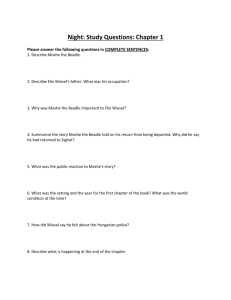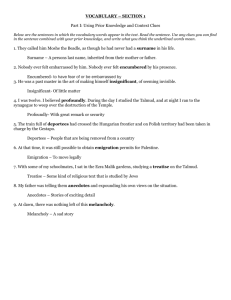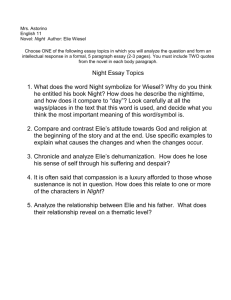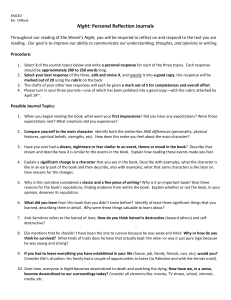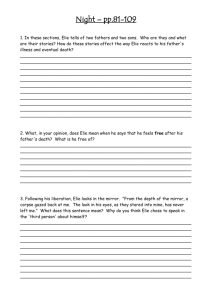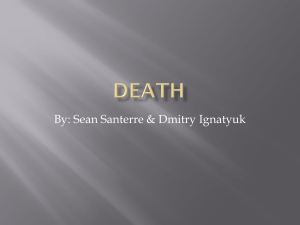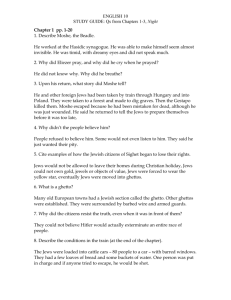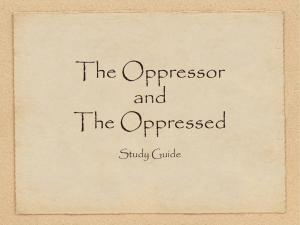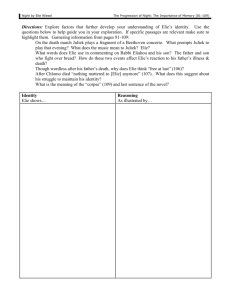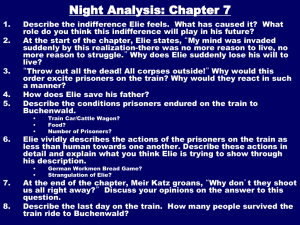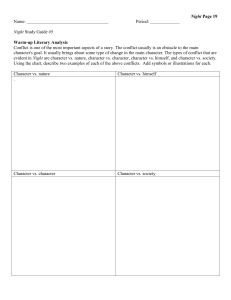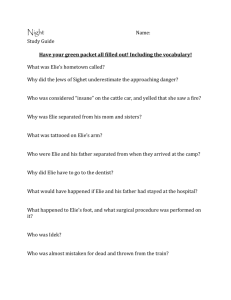Chapters 1
advertisement
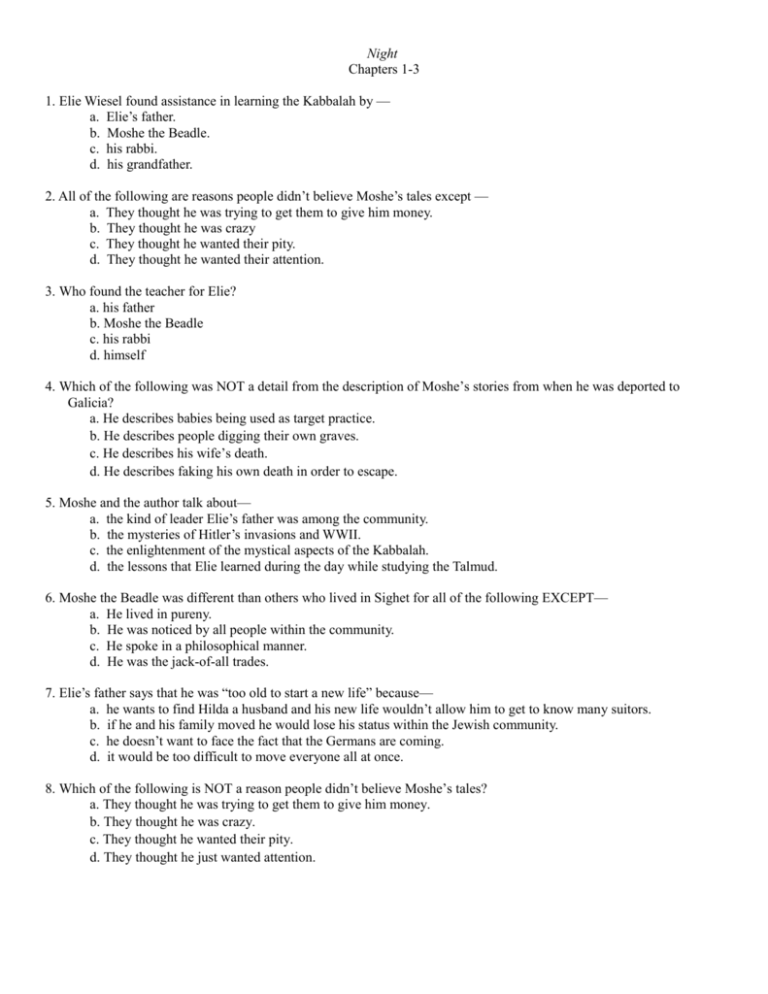
Night Chapters 1-3 1. Elie Wiesel found assistance in learning the Kabbalah by — a. Elie’s father. b. Moshe the Beadle. c. his rabbi. d. his grandfather. 2. All of the following are reasons people didn’t believe Moshe’s tales except — a. They thought he was trying to get them to give him money. b. They thought he was crazy c. They thought he wanted their pity. d. They thought he wanted their attention. 3. Who found the teacher for Elie? a. his father b. Moshe the Beadle c. his rabbi d. himself 4. Which of the following was NOT a detail from the description of Moshe’s stories from when he was deported to Galicia? a. He describes babies being used as target practice. b. He describes people digging their own graves. c. He describes his wife’s death. d. He describes faking his own death in order to escape. 5. Moshe and the author talk about— a. the kind of leader Elie’s father was among the community. b. the mysteries of Hitler’s invasions and WWII. c. the enlightenment of the mystical aspects of the Kabbalah. d. the lessons that Elie learned during the day while studying the Talmud. 6. Moshe the Beadle was different than others who lived in Sighet for all of the following EXCEPT— a. He lived in pureny. b. He was noticed by all people within the community. c. He spoke in a philosophical manner. d. He was the jack-of-all trades. 7. Elie’s father says that he was “too old to start a new life” because— a. he wants to find Hilda a husband and his new life wouldn’t allow him to get to know many suitors. b. if he and his family moved he would lose his status within the Jewish community. c. he doesn’t want to face the fact that the Germans are coming. d. it would be too difficult to move everyone all at once. 8. Which of the following is NOT a reason people didn’t believe Moshe’s tales? a. They thought he was trying to get them to give him money. b. They thought he was crazy. c. They thought he wanted their pity. d. They thought he just wanted attention. 9. What news does Elie’s father return with after his late-night meeting of the council? a. They are going to be sent to Auschwitz. b. They are going to be deported, destination unknown. c. They are going to Palestine. d. They are going to America. Chapter 1 Short Answer: Answer in complete sentences. 10. Explain the following line. “The ghetto was ruled by neither German nor Jew; it was ruled by delusion.” Chapter 2 11. How many people ride on each train car? a. 50 b. 80 c. 100 d. 120 12. Madame Schâchter imagines during the train ride she sees — a. dead babies b. the gas chambers c. the fire d. the future 13. When her hallucinations come true, this is an example of — a. metaphor b. simile c. personification d. foreshadowing 14. Wiesel’s description of Madame Schâchter, “looked like a withered tree in a cornfield”, is an example of — a. personification b. hyperbole c. simile d. anaphora 15. Mrs. Schâchter affected those in the cattle car with her screams by — a. causing them to try and comfort her because she was ill. b. ignoring her to make her silent. c. triggering them to begin to howl and act to one another. d. instigating them to bludgeon her to keep her silent. 16. Finally as the prisoners unloaded from the train they had arrived — a. in Kashau. b. at Auschwitz. c. in a work camp. d. at a brick factory plant. Chapter 2 Short Answer: Answer in complete sentences. 17. What was significant about the time of their arrival? Chapter 3 18. Immediately after the Jews were unloaded from the train the German officers — a. gave them bread and water because of dehydration. b. allowed them to speak and talk amongst themselves. c. immediately separated the men and the woman no matter their age. d. none of the above. 19. Dr. Mengele purpose as the men marched in front him was to — a. allow him to ask them questions about where they were from for documentation purposes. b. decide if they were to go, to the right for the gas chamber or the left for the crematoria. c. oversee if they were healthy enough to participate in his work program. d. ensure they were allowed to stay with their families while staying at the camp. 20. Some of the younger men wanted to rush the guards, even if they died in the effort however, the older people counseled — a. they should try and plan something at another time. b. they should not attempt anything and just have faith and hope for the best. c. their knifes would not stop them. d. all the above. 21. Elie witnessed while he was standing in the line — a. a pile of babies being dumped to be burned. b. others walking towards the barracks. c. other yelling at each other over food. d. his father weeping and crying over his guilt. 22. When Elie realized that he and his father might be burned he devise a plan — a. to escape. b. to attack the officers. c. to electrocute himself. d. to find his mother and sister. 23. True or False. Elie says he is a student. 24. Wiesel and his father approaching the inferno is particularly vivid where the author achieves— a. suspense b. foreshadowing c. imagery d. irony 25. One way an author has to effectively emphasize a point is through selective repetition of a word or phrase. Elie uses the anaphora, “Never Shall I,” which invokes an emotion of ______________. Explain. 26. The next day, the prisoners underwent a last step of their admission process where they marched — a. to drudgery in the camp. b. to be transported to another concentration camp. c. to another selection process by Dr. Mengele. d. to the showers to be disinfected. Chapter 3 short answer: Write in complete sentences. 27. What was unusual about the prisoner in charge of their barracks? 28. What did Stein want? 29. Elie and his father tried to avoid being transported anywhere else. How were they able to avoid being transported?
